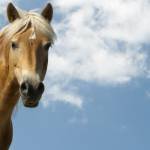Feed Management as a Factor in Treating Heaves in Horses

Frequently compared to asthma in humans, heaves (recurrent airway obstruction, chronic obstructive pulmonary disease) in horses is characterized by overly reactive airways. Affected horses show coughing, forced expiration of air, and a heave line at the base of the ribs associated with muscular hypertrophy caused by the effort of expelling air from the lungs.
Horses with this condition frequently have a nasal discharge. The lungs lose their elasticity as the disease progresses, resulting in heightened respiratory distress. Affected horses tend to be very hard keepers and their athletic ability is impaired, especially in events where maximal effort is required.
The exact cause of heaves in horses is not clearly understood, nor is there an effective cure. Hence, management of the disease is the sole way in which horses can remain comfortable. Nutritional and environmental management are both important measures that can significantly reduce signs in affected horses.
Helpful changes to the feeding routine are fairly simple to implement. Most of the time, a horse with heaves is best kept outside in the pasture rather than in a barn. Keeping the horse’s environment as free from dust and mold spores as possible is the most effective way to treat the disease. Hay should be dampened prior to feeding. This practice minimizes dust, mold spores, and other airborne particulate matter. The use of fiber sources other than long-stem hay can minimize allergic reactions. Cubed hay, shredded beet pulp, and mashes made with oat or wheat chaff are alternatives that can replace a portion of the long-fiber hay ration.
In addition to nutritional management, several other things can be done to reduce the problem of the disease in affected horses. Heavey horses should be bedded on paper, cardboard, clean wood shavings, or rubber mats in preference to bedding on straw or hay. Never clean the barn with a heavey horse inside. Sweeping, dusting, moving hay into and out of the loft, and other common barn activities increase the amount of airborne particulate matter which results in an increase in allergic response of affected horses. Provide for good ventilation in the barn. Airflow increases the fresh air available to the horse and helps to dissipate the ammonia in the stall. Ammonia, like dust, can serve as a severe respiratory irritant, posing a problem for the horse with compromised airways. Horses with chronic heaves may also benefit from the use of expectorants to reduce coughing, and bronchodilators to allow for eased breathing.








